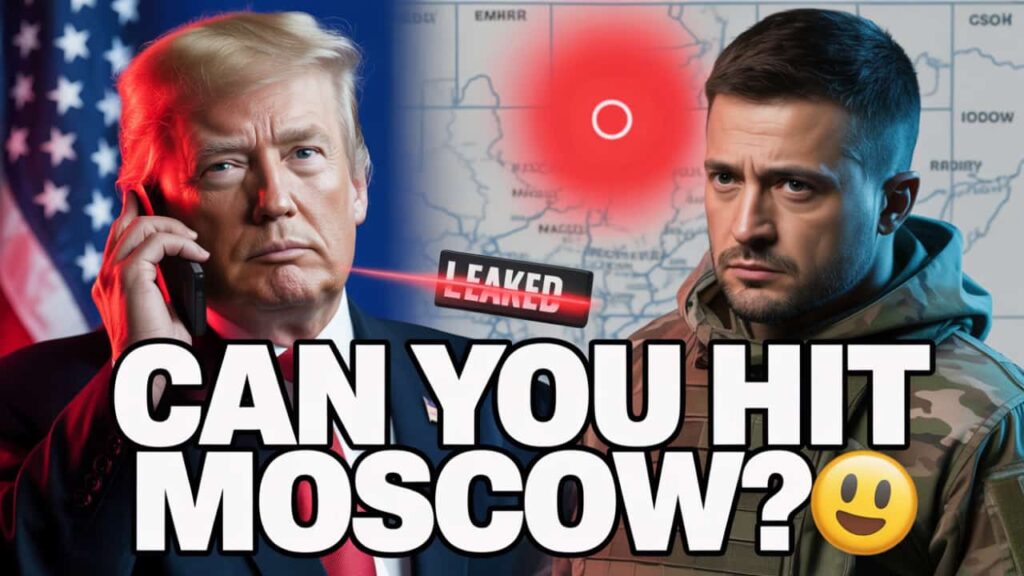The Trump Ukraine Moscow call has ignited new debate about U.S. involvement in the Russia-Ukraine conflict, following reports that Donald Trump directly asked Ukrainian President Volodymyr Zelenskyy whether Ukraine could strike Moscow.
According to sources briefed on the July 4 conversation, Trump urged Zelenskyy to consider deep strikes inside Russian territory.
“Volodymyr, can you hit Moscow? Can you hit St. Petersburg too?” Trump reportedly asked.
Zelenskyy replied, “Absolutely. We can—if you give us the weapons.”
The Trump Ukraine Moscow call has since become a focal point in discussions about NATO’s limits, U.S. strategic red lines, and whether this represents a calculated pressure tactic—or reckless escalation.
Table of Contents
📞 Inside the Trump Ukraine Moscow Call
The call reportedly took place over a secure line and came as Trump introduced a plan to expand Ukraine’s access to long-range weapons through third-party NATO member transfers. While not confirmed by the White House, multiple officials told the Financial Times and The Guardian that Trump’s intent was to force Russia back to the negotiating table by hitting hard within its borders.
Key points from the Trump Ukraine Moscow call include:
- Trump emphasized the need to “make [the Russians] feel the pain.”
- He asked pointed questions about Ukraine’s strike range capabilities.
- U.S. aides followed up with a list of long-range systems available for indirect transfer.
- Tomahawk cruise missiles, however, remain off the table due to U.S. hesitation.
🌍 NATO’s Balancing Act After the Trump Ukraine Moscow Call
The Trump Ukraine Moscow call presents a challenge for NATO. Trump’s suggestion to escalate Ukraine’s strike depth via allies like the UK, France, and Germany adds pressure on the alliance to respond without provoking direct Russian retaliation.
Analysts say this tactic is designed to:
- Allow Western allies to arm Ukraine without implicating the U.S. directly.
- Test Russia’s reaction to deeper strikes without a formal NATO signature.
- Create a psychological edge for Ukraine on the battlefield.
However, experts warn that striking Moscow—even indirectly—would cross a significant threshold and could prompt a broader regional or global response.
🔥 Strategic Fallout and Political Repercussions
The Trump Ukraine Moscow call has triggered widespread reaction in both U.S. and European political circles.
In an interview with the BBC following the leak, Trump stated:
“I’m disappointed—but not done—with Putin.”
This ambiguous remark has left analysts debating whether Trump was signaling an end to diplomacy or advocating for aggressive peace-through-strength tactics.
Meanwhile, Moscow has remained silent on the reported call but is likely recalibrating its response options. Kremlin insiders reportedly view the call as a potential precursor to expanded Western intervention.
🎯 What Makes the Trump Ukraine Moscow Call So Critical?

This wasn’t just a private diplomatic exchange—it was a signal. The Trump Ukraine Moscow call reflects:
- A possible shift in Western posture from containment to targeted confrontation.
- Ukraine’s readiness to escalate, conditional on access to advanced strike systems.
- The fragility of NATO unity, with member states divided over how far to go.
- The continuing use of political pressure to shape wartime strategies.
Trump’s assertive tone could either force faster diplomatic resolutions or trigger miscalculations that lead to unintended escalation.
📌 Conclusion: What Happens After the Trump Ukraine Moscow Call?
The Trump Ukraine Moscow call marks one of the most aggressive rhetorical shifts since the beginning of the war. It illustrates Trump’s belief in decisive, forward military support—but raises major concerns about where those lines should be drawn.
As Ukraine continues to push for Western firepower and Russia recalibrates its defenses, the world is left asking:
Is this the beginning of a wider war—or the bluff that forces peace talks?
❓ FAQ: Trump Ukraine Moscow Call
What exactly did Trump say to Zelenskyy?
According to reports, Trump asked if Ukraine could strike Moscow and encouraged deeper attacks inside Russia.
Why is this call considered dangerous?
Long-range strike systems including cruise missiles. The U.S. has not approved the direct transfer of Tomahawk missiles but may allow indirect sharing through allies.
How has Ukraine responded?
Zelenskyy confirmed Ukraine’s capability, stating they could strike targets like Moscow if given the appropriate weapons.
Is this Trump’s official policy?
No formal policy has been announced. This call reflects Trump’s personal stance and possible strategic pressure ahead of further NATO and election debates.
Visit www.documentarytimes.com for more exclusive analysis, global conflict updates, and investigative reporting.